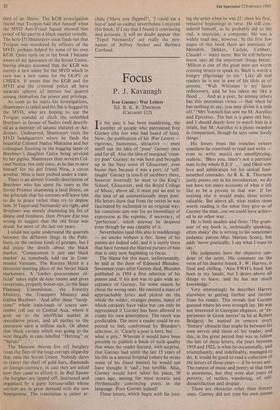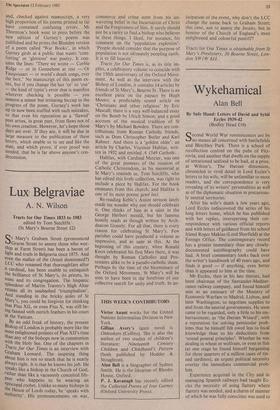Focus
P. J. Kavanagh
Ivor Gurney: War Letters Ed. R. K. R. Thornton (Carcanet £12)
In the past it has been maddening, the number of people who patronised Ivor Gurney (the few who had heard of him). Now, the publication of his War Letters vigorous, humorous, attractive — must snuff out the idea of 'poor' Gurney once and for all. Also the idea of marginal 'coun- try poet' Gurney: he was born and brought up in the busy town of Gloucester, even busier then because it was a port; of 'self- taught' Gurney (a touch of snobbery there, however inverted): he went to the King's School, Gloucester, and the Royal College of Music; above all, it must put an end to the idea of an unintentionally inept poet. His letters show that from the outset he was fascinated by technique in an original way; his conscious aim was for an immediacy of expression at the expense, if necessary, of `perfection', which anyway he despised even though he was capable of it.
Nevertheless (and this also is maddening) — no smoke without a fire. Some of his poems are indeed odd, and it is surely these that have formed the blurred picture of him that is only now beginning to focus.
The blame for this must, unfortunately, be laid at the door of Edmund Blunden. Seventeen years after Gurney died, Blunden published in 1954 a first selection of his poems and, if his aim was to gain wide ac- ceptance of Gurney, for some reason he chose the wrong ones. He omitted a mass of approachable lyrics and picked on the whole the wilder, stranger poems, many of which certainly have value but can only be appreciated if Gurney has been allowed to create his own atmosphere. The result was predictable. The most a reader could be ex- pected to feel, confronted by Blunden's selection, is: 'Clearly a poet is here, but ... what a pity.' Whereas it would have been possible to publish a book of such quality that when the reader learned, with surprise, that Gurney had spent the last 15 years of his life in a mental hospital (where he wrote some of his finest poems) he would not have thought it 'sad', but terrible. Also, Gurney would have taken his place, 30 years ago, among the most ecstatic and rhythmically convincing poets in the language. Poor Gurney indeed!
These letters, which begin with his join-
ing the army when he Was 25, show his first, tentative beginnings in verse. He still con- sidered himself, as he probably did to the end, a musician, a composer. He was a widely read one, however. In the first few pages of this book there are mentions of Meredith, Dekker, Carlyle, Cobbett, Claudel — many more. But he still believes music says all the important things better. 'Milton is one of the great men not worth crossing streets to speak to. Bach is worth a hungry pilgrimage to see.' Like all real readers he is not in awe of his idols or of anyone. 'Walt Whitman is mY latest rediscovery, and he has taken me like a flood ... And as a poet, he among others has this enormous virtue — that when he has nothing to say, you may divine it a mile off.' Mrs Voynich has sent me M. Aurelius and Epictetus. The last is a game old boy, and I should dearly love to watch him in a strafe, but M. Aurelius is a pious swanker in comparison, though he says some lovely things.'
His letters from the trenches (where somehow he contrived to read and write even to write music) are unselfpitying, realistic. 'Bless you, there's not a patriotic man in the whole B.E.F ' and filled with love and admiration for his stoical foul- mouthed comrades. As R. K. R. Thornton justly points out in his introduction, we do not have too many accounts of what it felt like to be a private in that war. If for nothing else it would make these letters valuable. But above all, what makes them worth reading is the sense they give us of Gurney the man, one we could have achiev- ed in no other way.
He is both modest and firm: 'The gram- mar of my book is, technically speaking, often shaky' (he is writing to his sometimes pedantic patron Miss Marion Scott), but adds 'never poetically. I say what I want to say.'
His judgments have the objective can- dour of the artist. His comment on the verse of his dearest friend, F. W. Harvey, is final and chilling. 'Also FWH's book has been in my hands, but I desire above all things to learn, and he has not much knowledge.'
Very interestingly he describes Harvey elsewhere as getting further and further from his reader. This reveals that Gurney guessed where his own strength lay. He was not interested in Georgian elegance, or 'ex- periments in Greek metres' (a hit at Robert Bridges); he wanted to remove every 'literary' obstacle that might lie between his own nerves and those of his reader; and this, in the great period that was to follow the last of these letters, the years between 1918 and 1922, is what he occasionally, and triumphantly, and indefinably, managed to do. It would be good to read a collection of the letters of those years — if he wrote any. The output of music and poetry at that time is enormous, but they were also years of poverty, of restless wandering, of self- dissatisfaction and despair. There are obstacles other than literary ones. Gurney did not type his own poems and, checked against mariuscript, a very high proportion of his poems printed so far have contained confusing errors. Mr Thornton's book went to press before the new edition of Gurney's poems was published and he prints the Blunden version of a poem called 'War Books', in which Gurney girds at a public that wants `com- forting' or `glorious' war poetry. It con- tains the lines: 'There we wrote — Corbie Ridge — or in Gonnehem at rest —/Or Fauquissart — or world's death songs, ever the best.' No manuscript of this poem ex- ists, but if you change the last 'or' to `our' — the kind of typist's error that is manifest wherever checking is possible — you remove a minor but irritating hiccup in the progress of the poem. Gurney's work has up to now been stuffed with such mistakes, so that even his reputation as a 'flawed' poet arises, in great part, from flaws not of his own creation. However, let's hope those days are over. If they are, it will be due in large measure to the publication of these letters, which enable us to see and like the man, and which prove, if ever proof was needed, that he is far above anyone's con- descension.







































 Previous page
Previous page